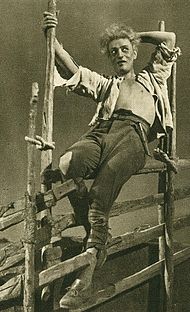| From the 1876 premiere of Grieg's Peer Gynt |
Peer uses his imagination to get ahead, but he's also a rascal who scams other people, especially women, and gets scammed himself, also by women. Peer goes to North Africa, but at heart he's the same local yokel who hangs out with trolls, whose take on reality is defiantly perverse Whatever the Bøygen is, he doesn't overcome it so much as scam his way past. In the end, he's back where he came from. Solveig doesn't have much sense either. She still loves the scoundrel. Not all so different from the Troll King who feasts on cow turds and ox piss, whether bitter or sweet "as long as they're our cow turds and ox piss". Grieg's music is so wonderful that you can blissfully enjoy fantasies of fjords, mountains and goblins, but knowing the context is even more rewarding.
I first heard the "full" edition with dialogue in 2001 when Manfred Honeck conducted it with the Gothenburg Symphony Orchestra, with Bo Skovhus, who stole the show, even from a star like Barbara Bonney. In 2011, Marc Minkowski conducted the BBC SO at the Barbican Hall with Miah Persson, Johannes Weisser and Anita Hallenberg.
There are numerous recordings of Grieg's Peer Gynt suites but extended versions with text are few. In 2005, the Bergen Philharmonic Orchestra under Ole-Kristian Ruud recorded the incidental music with dialogue in Norwegian. The following year, Guillaume Tournaire conducted the Orchestre de la Suisse Romande in the world premiere of the Perroux edition, with texts in English translation. Hearing the music in context is important, but once you've got the picture, so to speak, it's better to hear the words in Norwegian, since the language fits the music so well.
The Orchestre de la Suisse Romande have much more stylish polish but the Bergeners are nicely down to earth. The Bergen singers and choir are clearly native speakers, which gives their singing natural verve. On the other hand, the "Swiss" orchestra used a professional Hardanger player, using a traditional fiddle, as opposed to a violin. This electrifies the performance, giving it a wildness and crazy freedom conventional orchestras can't quite manage. It shouldn't be too difficult for Bergen to one day record the piece again with an authentic Hardanger fiddle. They're sounding particularly good these days with Edward Gardner, so maybe they should revisit the full Peer Gynt.
Please see my other posts on Grieg, Norway, Norwegian film and Ibsen by following the labels below.
